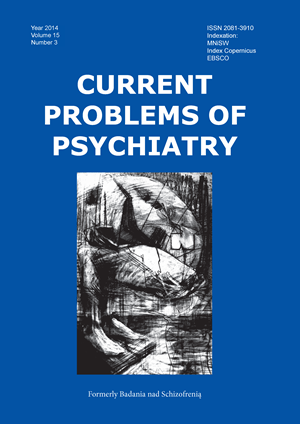Psychometric properties of the Online Gaming Addiction Questionnaire
Keywords:
questionnaire, online gaming addictionAbstract
This article describes the psychometric properties of the Online Gaming Addiction Questionnaire (KBGUI). An original version of KBUGI, consisting of 130 items, was used to survey a group of 576 adolescents aged 16 to 19 years, inhabitants of the Lublin Province. On the basis of factor analysis, four factors (scales) were identified: (1) Loss, (2) Entertainment and search for new stimuli, (3) Compensation and escape, (4) Violence and domination. Items with the lowest factor loadings and the lowest factor specificity indexes were rejected. The factors identified explained 54% of the total variance. The final version of the KBGUI questionnaire consisted of 74 questions. The coefficients of reliability for the individual scales were high: Cronbach’s alpha = 0.98 for Loss, Cronbach’s alpha = 0.93 for Entertainment and search for new stimuli, Cronbach’s alpha = 0.89 for Compensation and escape, and Cronbach’s alpha = 0.83 for Violence and domination. The reliability coefficient for the global KBUGI score was 0.97. The KBUGI questionnaire is a reliable instrument with good psychometric properties which can be used to asses different dimensions of addiction to Internet games.
References
przedszkolnym. Curr. Probl. Psychiatry, 2010: 11(4): 375-379.
2. Johansson A., Götestam K.G. Problems with Computer Games without Monetary Reward: Similarity to Pathological Gambling. Psychol. Rep., 2005; 95(2); 641–650.
3. Gentile D.A. Pathological Video Game Use Among Youth Ages 8 to 18: a National Study. Psychol. Sci., 2009; 20(5): 594-602.
4. Rehbein F., Kleimann M., Mediasci G., Mossle T. Prevalence and Risk Factors of Video Game Dependency in Adolescence: Results of a German Nationwide Survey. Cyberpsychol. Behav. Soc. Netw., 2010; 13(3): 269–277.
5. Müller K.W., Janikian M., Dreier M., Wölfling K., Beutel M.E., Tzavara C., Richardson C., Tsitsika A. Regular gaming behavior and internet gaming disorder in European adolescents: results
from a cross-national representative survey of prevalence, pre-dictors, and psychopathological correlates. Eur. Child Adolesc. Psychiatry, 2014; DOI 10.1007/s00787-014-0611-2.
6. American Psychiatric Association. Diagnostic and statistical manual of mental disorders (5th ed.). Arlington, VA: American Psychiatric Publishing; 2013.
7. Kim E.J., Namkoong K., Ku T., Kim S.J. The relationship between online game addiction and aggression, self-control and narcissis-tic personality traits. Eur. Psychiatry, 2008; 23(3): 212-218.
8. Ng B.D., Wiemer-Hastings P. Addiction to the Internet and online gaming. Cyberpsychol. Behav., 2005; 8(2): 110-113.
9. Ryan R.M., Rigby C.S., Przybylski A. The Motivational Pull of Video Games: A Self-Determination Theory Approach. Motiv. Emot., 2006; 30(4): 347-363.
10. Wan C.S., Chiou W.B. The motivations of adolescents who are addicted to online games: A cognitive perspective. Adolescence, 2007; 42(165): 179-197.
11. Wan C.S., Chiou W.B. Why are adolescents addicted to online gaming? An interview study in Taiwan. Cyberpsychol. Behav., 2006; 9(6): 762-766.
12. Hellström C., Nilsson K.W., Leppert J., Ĺslund C. Influences of motives to play and time spent gaming on the negative conse-quences of adolescent online computer gaming. Comp. Hum. Behav., 2012; 28(4): 1379-1387.
13. Kneer J., Glock, S. Escaping in digital games: The relationship between playing motives and addictive tendencies in males. Comp. Hum. Behav., 2013; 29(4): 1415-1420.
14. Horzum M.B. Examining computer game addiction level of prima-ry school students in terms of different variables. Educ. Sci., 2011; 36(159): 56-68.
15. Chiu S., Lee J.Z., Huang D.H. Video game addiction in children and teenagers in Taiwan. Cyberpsychol. Behav., 2004: 7(5): 571-581.
16. Fang X., Zhao F. Personality and enjoyment of computer game play. Computers in Industry,2010; 61(4): 342-349.
17. Slater M.D., Henry K.L., Swaim R.C., Anderson L.L. Violent media content and aggressiveness in adolescents: A downward spiral model. Comm. Res., 2003; 30: 713-736.
18. Przybylski A., Ryan R.M., Rigby C.S. The motivating role of violence in video games. Pers. Soc. Psychol. Bull., 2009; 35(2), 243-259.


